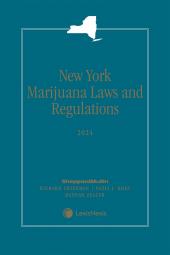New York Marijuana Laws and Regulations
Select a format
 International Order Inquiry
International Order Inquiry
Select subscription type
Terms & conditions
Subscribers receive the product(s) listed on the Order Form and any Updates made available during the annual subscription period. Shipping and handling fees are not included in the annual price.
Subscribers are advised of the number of Updates that were made to the particular publication the prior year. The number of Updates may vary due to developments in the law and other publishing issues, but subscribers may use this as a rough estimate of future shipments. Subscribers may call Customer Support at 800-833-9844 for additional information.
Subscribers may cancel this subscription by: calling Customer Support at 800-833-9844; emailing customer.support@lexisnexis.com; or returning the invoice marked "CANCEL".
If subscribers cancel within 30 days after the product is ordered or received and return the product at their expense, then they will receive a full credit of the price for the annual subscription.
If subscribers cancel between 31 and 60 days after the invoice date and return the product at their expense, then they will receive a 5/6th credit of the price for the annual subscription. No credit will be given for cancellations more than 60 days after the invoice date. To receive any credit, subscriber must return all product(s) shipped during the year at their expense within the applicable cancellation period listed above.
The total price includes the product(s) listed in the Order Form and any Updates for a limited period (minimum period of 30 days) after the order is placed ("Order Window"). Shipping and handling fees are not included in the grand total price.
All shipments may be returned, at subscribers' expense, for full credit of the Price within 30 days of receipt.
Shipments may not be returned, and no credits will be issued, more than 30 days after receipt.
After the Order Window, subscribers will receive notice of Updates along with the then-current grand total price and order process as Updates become available. Subscribers will only be shipped those Updates they specifically request.
Product description
View a sample of this title using the ReadNow feature
New York Marijuana Laws and Regulations from LexisNexis is the authoritative resource for medical and retail marijuana laws in the state of New York.
Compiled in partnership with Richard A. Friedman, Nazia J. Khan and Hannah Zelcer of the national law firm Sheppard Mullin Richter & Hampton LLP, New York Marijuana Laws and Regulations offers users a comprehensive guide new and growing cannabis-related laws in New York.
New York Marijuana Laws and Regulations is the authoritative resource for laws governing both medical and recreational cannabis in New York. The title also includes the full text of the New York cannabis law.
AUTHORS & BIOS
Chapter 2, Licensing Issues in the Cannabis Industry and Chapter 3, Overview of the Cannabis Social Equity Program
Hannah Zelcer is an associate in the Corporate Practice Group of Sheppard Mullin Richter & Hampton LLP, and is a member of the firm’s Cannabis team. Hannah’s practice is focused on Corporate and Securities Law, counseling publicly-held companies in corporate finance and capital markets transactions, public reporting matters, and corporate governance matters relating to the SEC, Nasdaq, and FINRA. Prior to joining the firm, Hannah was an associate at Schlam Stone and Dolan LLP. Hannah received her JD from Cardozo School of Law in 2020 and her BA from Binghamton University in 2015.
Chapter 4, Cannabis and Intellectual Property Issues&8212;Patents
Matthew Benz is an associate in the Finance and Bankruptcy Practice Group in Sheppard Mullin’s Chicago office. Prior to joining Sheppard Mullin, Matt received a JD in 2022 from the University of Illinois College of Law and a BA in 2019 from the University of Illinois.
Chapter 5, Cannabis and Intellectual Property Issues &8211; Trademarks
Tyler Baker is a senior associate in Sheppard Mullin’s intellectual property practice group, and specializes in trademark, trade dress, trade secrets and false advertising matters. He regularly manages and prosecutes client trademark portfolios, and has extensive experience representing clients in trademark infringement actions in federal court and before the USPTO’s Trademark Trial and Appeal Board. He additionally counsels and advises clients in the development and protection of their trademarks and brands.
Tamy Dawli is an Associate in the labor and employment practice group and has experience in assisting with advising and counseling employers with day-to-day employment issues, workplace investigations, and defending employers against various labor and employment subject areas.
Sylvia Waghorne is a Law Clerk in the Business Trial practice group, pending admission to the New York Bar. Sylvia’s practice encompasses general commercial litigation, and she has experience working on cases involving complex business litigation, trade secrets litigation, and construction disputes.
Chapter 6, Insurance and the Cannabis Industry Under Federal and New York Law
Richard A. Friedman is a partner in the Corporate Practice Group in the New York office of Sheppard, Mullin, Richter & Hampton LLP, and is a member of the firm’s Blockchain & Fintech, Cannabis, ESG & Sustainability, Life Sciences & FDA, and Securities Enforcement teams.
Richard is principally engaged in the practice of Corporate and Securities Law, counseling privately and publicly-held companies in many sectors, ranging from technology to biotechnology and life sciences, as well as companies engaged in the cannabis and psychedelics industries, on a wide range of matters. His extensive experience includes advising issuers, placement agents, underwriters, and investors in connection with private placements and public offerings (IPOs and Follow-On Offerings) (including SPACs), reverse mergers (both domestic and foreign companies), secured and unsecured private equity financing transactions (PIPEs), as well as shelf offerings (RDs, CMPOs and ATMs). He also represents publicly-held companies with their ongoing 1934 Act SEC reporting obligations, and with NASDAQ, NYSE and other exchange listing and compliance matters. In addition, he represents both private and public companies with a wide variety of corporate transactions, including mergers and acquisitions, joint ventures, employment and shareholder agreements, and the formation of private equity hedge funds. Richard’s practice also involves representation of Broker-Dealers and registered individuals in a wide array of matters, including ongoing compliance, regulatory inquiries and disciplinary proceedings before governmental and self-regulatory organizations, such as the SEC, FINRA, NYSE and State Securities Commissions.
Chapter 7, Banking Law in Relation to the Cannabis Industry
Nazia Khan is a senior associate in the Corporate Practice Group of Sheppard Mullin Richter & Hampton. She is principally engaged in the practice of corporate and securities law and represents public and private companies in various industries such as cannabis, financial services, food and beverage, healthcare, life sciences, oil and gas, as well as real estate investment trusts (REITS) in corporate finance and capital markets transactions. Her extensive experience includes representing domestic and foreign companies as well as underwriters in various offerings including initial public offerings, follow-on and second offerings, private placements and other securities offerings. She also represents companies in reverse mergers as well as mergers and acquisitions. In addition, Ms. Khan advises clients on a broad range of securities law, public reporting matters and corporate governance matters relating to the SEC, Nasdaq, NYSE and FINRA. She has been named as a New York Metro Rising Star, Super Lawyer, in Securities and Corporate Finance (2017 &8211; 2023); Ones to Watch &8211; Corporate Law, Best Lawyers (2021 and 2022); and Who’s Who in America (2019).
Chapter 8, Taxation and Cannabis
Justin Hepworth is a partner in the Tax and Estate Planning practice group in the firm’s Orange County office. Justin regularly advises clients on state and local tax implications of restructurings, mergers, acquisitions, spinoffs, and asset sales. Justin advises on audit defense, voluntary disclosure, unclaimed property (escheat law), and other controversy and compliance matters. He has extensive experience handling a broad range of multistate issues, including nexus, sales and use tax exemptions, sourcing and characterization, research and development credits, unitary business matters, California Prop. 13 change in ownership issues, and residency planning and audits. Justin is a member of the Tax Sections of the California, Texas, and American Bar Associations. He is also a frequent speaker on state tax matters at conferences throughout the country, including those sponsored by the American Bar Association, the State Bar of California, Taxation Section, and Tax Executives Institute (TEI).
Niya Tang is a partner in the Tax, Employee Benefits, and Trust & Estates practice group in the firm’s New York office. Niya focuses her practice on U.S. federal income taxation of corporations, s-corporations, and partnerships, including the tax considerations of mergers and acquisitions, restructurings, real estate, joint ventures, and financings. Niya has extensive experiences on a broad range of U.S. and international tax matters, and also provides advice on the formation and operation of private equity funds and hedge funds.
Iman Naieem is an Associate in the Tax, Employee Benefits and Executive Compensation practice group in the firm’s Washington, D.C. office. Iman assists clients in drafting all types of executive employment, separation and consulting agreements, equity plans and agreements, tailored bonus and commission plans, and employment-related agreements and policies concerning confidentiality and non-solicitation, and numerous other employment-related documents. Prior to joining Sheppard Mullin, Iman received her J.D. from the George Washington University Law School where she served as the Managing Editor for the Federal Circuit Bar Journal, a Student Attorney for the Public Justice Advocacy Clinic, and the President for the Muslim Law Student Association.
Chapter 9, Cannabis-Related Labor and Employment Issues
Lindsay Stone is an employment defense litigator who represents management against a wide array of employment claims, including disputes related to discrimination, harassment, retaliation, wrongful termination, restrictive covenant and non-competition agreements, misappropriation of trade secrets, wage/hour claims, and class and collective actions. She has particular expertise with pay equity litigation. Lindsay regularly represents clients in federal and state court, in arbitrations before FINRA, the American Arbitration Association, and JAMS, and in administrative proceedings before the Equal Employment Opportunity Commission and various state and city agencies.
In addition to her litigation practice, Lindsay routinely counsels domestic and international clients on employment matters that affect their business, including employee discipline and termination, policy creation and administration, restrictive covenants, employment contracts, internal investigations, and leave of absence issues. Lindsay is experienced in understanding and meeting the complex needs of clients in a variety of industries, including financial services, media and entertainment, advertising, tech, healthcare, and sports.
Lindsay is actively involved in pro bono work at the firm, where she represents clients that include domestic violence victims and children seeking asylum. She also serves as a trusted pro bono employment advisor to non-profit organizations throughout New York City. In 2017, Lindsay was named Sheppard Mullin’s Pro Bono Attorney of the Year.
Chapter 10, New York State Adult-Use Cannabis Real Estate Related Issues
Ross Honig is a partner in the Real Estate, Energy, Land Use & Environmental Practice Group in the firm's New York office.
With more than 30 years in private practice, Ross focuses primarily on commercial real estate financings. He also represents clients in the acquisition, disposition, and leasing of commercial properties. His clients include financial institutions, private and public commercial lenders, REITs, private sellers, and purchasers.
Ross has significant experience handling transactions involving floating rate bridge loans intended to be included in public CLO transactions, fixed-rate, permanent mortgage loans intended to be sold in the commercial mortgage-backed securities market, as well as construction, multi-draw, and mezzanine loan transactions. His clients’ transactions are secured by all asset classes, including office, retail, hotel, multifamily, student housing, industrial, cannabis processing and retail facilities, and mobile home parks located throughout the United States. Ross also counsels clients in mortgage loan purchase and sale agreements, intercreditor and participation agreements, and asset-based loan originations. He advises clients on workouts and restructuring of defaulted and non-performing loans.
Chapter 11, Insolvency and Debt Remedies
Colin Davidson is an associate in the Finance and Bankruptcy Practice Group in the firm's New York office. Colin’s practice incorporates all areas of corporate restructuring, bankruptcy, and insolvency-related matters. Colin represents companies, creditors, distressed purchasers, and other key stakeholders in all aspects of corporate restructuring, bankruptcy, and financial distress. He has experience guiding clients to value-added results in out-of-court and in-court restructurings. He is currently focusing his practice on both debtor and creditor representations in out of court loan workouts, restructurings, liquidations, and litigations.
Prior to joining Sheppard Mullin, Colin served as a law clerk to the Honorable James L. Garrity, Jr. of the United States Bankruptcy Court for the Southern District of New York and to the Honorable Louise De Carl Adler of the United States Bankruptcy Court for the Southern District of California. Colin received a JD in 2017 from Brooklyn Law School.
Chapter 12, Data Privacy Issues in the New York Cannabis Industry
Kari Rollins is the Co-Managing Partner of Sheppard Mullin’s New York office and a partner within the firm’s Privacy and Cybersecurity Team. Kari offers her clients the continuity of effective assistance during all three critical stages of the data privacy lifecycle: (1) data privacy and cybersecurity preparedness (the before); (2) data breach investigation and response (the during); and (3) data privacy and data breach class action and regulatory defense (the after). As an experienced and seasoned class action defense litigator, Kari is known for bringing her significant data privacy and data breach response counselling experience to aid her clients in effectively defending and litigating data privacy, cybersecurity and data breach litigation pursued not only by private litigants but also regulatory authorities alike. Kari has been recognized as a trailblazer in breach response and since 2019, Kari has earned spots on Cybersecurity Docket’s "Incident Response 30/40/50", which recognizes the best and brightest in breach response. Legal 500 has also recognized Kari as a Leading Lawyer in Cybersecurity since 2020, and Crain’s New York Business named her as one of their Notable Women in Law.
eBooks, CDs, downloadable content, and software purchases are noncancelable, nonrefundable and nonreturnable. Click here for more information about LexisNexis eBooks. The eBook versions of this title may feature links to Lexis+® for further legal research options. A valid subscription to Lexis+® is required to access this content.
Table of contents
Chapter 1 An Overview of New York Cannabis Law
Chapter 2 Licensing Issues in the Cannabis Industry
Chapter 3 Overview of the Cannabis Social Equity Program
Chapter 4 Cannabis and Intellectual Property Issues—Patents
Chapter 5 Cannabis and Intellectual Property Issues - Trademarks
Chapter 6 Insurance and the Cannabis Industry Under Federal and New York Law
Chapter 7 Banking Law in Relation to the Cannabis Industry
Chapter 8 Taxation and Cannabis
Chapter 9 Cannabis-Related Labor and Employment Issues
Chapter 10 New York State Adult-Use Cannabis Real Estate Related Issues
Chapter 11 Insolvency and Debt Remedies
Chapter 12 Data Privacy Issues in the New York Cannabis Industry
 Lexis Nexis
Lexis Nexis 


